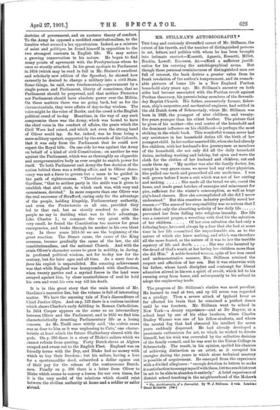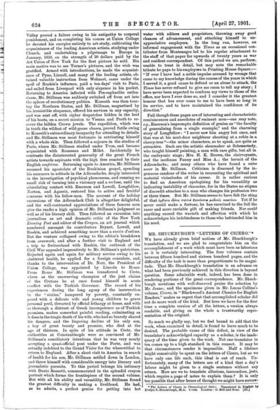MR. STILLMAN'S AUTOBIOGRAPHY.* THE long and curiously diversified career of
Mr. Stillman, the extent of his travels, and the number of distinguished persons in art, letters: and politics with whom he has been brought into intimate contact—Kosenth, Agassiz, Rossetti, Millet, Ruskin, Lowell, Emerson, &c.—afford a sufficient justifi- cation for his entering the autobiographical arena. But though these personal reminiscences of distinguished men are full of interest, the book derives a greater value from its frank revelation of the author's temperament, and its remark- able pictures of home life in a New England Puritan household sixty years ago. Mr. Stillman's ancestry on both sides had become associated with the Puritan revolt against Puritan theocracy, his parents being members of the Seventh. day Baptist Church. His father, successively farmer, fisher- man, ship's carpenter, and mechanical engineer, had settled in the old Dutch town of Schenectady, where Mr. Stillman was born in 1828, the youngest of nine children, and twenty- five years younger than his eldest brother. The picture that he gives of his mother—the real centre of the household and the dominant influence on his childhood—is perhaps the most striking in the whole book. This wonderful woman never had any assistance in her household duties till the birth of her youngest ehild. In her earlier married life, when she had already five children, with her husband's five journeymen as members of the household, she not only did all the daily household duties, including washing and baking, but spun and wove the cloth for the clothes of her husband and children, out and made them up. "My mother was also the family doctor, for, except in very grave cases, we never had any other physician. She pulled our teeth and prescribed all our medicines. I was well grown before I wore a suit which was not of her cutting and making She made all the bread we ate, cured the hams, and made great batches of sausages and mincemeat for pies, sufficient for the winter's consumption, as well as huge pig's-head cheeses. How she accomplished all she did I never understood." But this ceaseless industry probably saved her reason:—" The sense of her responsibility was so serious that I
think that only the absorbing activity of her daily life prevented her from falling into religious insanity. Her life was a constant prayer, a wrestling with God for the salvation
of her children Of her own salvation she had only a faltering hope, harassed always by a fear that she had at some time in her life committed the unpardonable sin, as to the nature of which she knew nothing, and which was therefore all the more feared, as the nature of it was to her the terrible
of life and d She was also had by mystery death haunted the dread of God's wrath at her loving her children more than she did Him." A noble-hearted woman, spite of her iron creed and undemonstrative manner, Mrs. Stillman retained the respect and affection of her son. But it was otherwise with his father, whose harsh discipline and contempt for liberal education stirred in his son a spirit of revolt, which led to his running away from home, and subsequently to his refusal to adopt the engineering trade.
The progress of Mr. Stillman's studies was most peculiar. He learned to read at two, and up till seven was regarded as a prodigy. Then a severe attack of typhoid fever so far affected his brain that he remained a perfect dunce until he was fourteen. Mr. Stillman went to school in New York—a dreary experience—and at De Ruyter, at a school kept by one of his elder brothers, where Charles Dudley Warner was one of his fellow-students, and where the mental fog that had obscured his intellect for seven years suddenly dispersed. He had already developed a passionate enthusiasm for art, to which he wished to devote himself, but his wish was overruled by the collective decision of the family council, and he was sent to the Union College in Schenectady. The result, in his opinion, spoiled his chances of achieving distinction as an artist, as 'it occupied his energies during the years in which alone technical mastery is possible of acquirement. He emerged from the experience with a divided allegiance: "enough devotion to letters to make it a satisfa,ction to wimpy myself with them, but boo much interest in art to be able to abandon it entirely." A brief experience of district school teaching in the neighbourhood of the Mohawk • The Autobiography of a Journalist. By W. J. StIllman. 2 vols. Lando* s Grant Bioharcla [Zial Valley proved a failure owing to his antipathy to corporal punishment, and on completing his course at Union College he devoted his energies entirely to art study, cultivating the acquaintance of the leading American artists, studying under Church, and undertaking a pilgrimage to Europe in January, 1850, on the strength of 30 dollars paid by the Art Union of New York for the first picture he sold. His main motive was to see Turner's pictures, and the wish was gratified. Armed with introductions, he made the acquaint- ance of Pyne, Linnell, and many of the leading artists, ob- tained valuable instruction from Wehnert, came under the spell of Ruskin's influence, paid a ten-days' visit to Paris, and sailed from Liverpool with only sixpence in his pocket. Returning to America infected with Pre-raphaelite enthu- siasm, Mr. Stillman was suddenly switched off from art into the sphere of revolutionary politics. Kossuth was then tour- ing the Northern States, and Mr. Stillman, magnetised by his irresistible eloquence, offered his services in any capacity, and was sent off, with cipher despatches hidden in the heel of his boots, on a secret mission to Vienna and Pesth to re- cover the hidden Crown jewels. The expedition, which was in truth the wildest of wild-goose chases, proved futile owing to Kossuth'e extraordinary incapacity for attending to details, and Mr. Stillman was most fortunate in extricating himself with a whole skin. Then followed a sojourn in the studios of Paris, where Mr. Stillman studied under Yvon, and became acquainted with Rousseau and Millet. Incidentally he contrasts the disinterested generosity of the great French artists towards aspirants with the high fees exacted by their English confreres. Returning again to America, Mr. Stillman resumed his apostolate of the Ruskinian gospel, spending his summers in solitude in the Adirondacks, deeply interested in the investigation of psychical phenomena, and running no small risk of turning into a visionary and a recluse, until the stimulating contact with Emerson and Lowell, Longfellow, Norton, and Agassiz, restored him to active and fruitful converse with his fellow-men. The account of the holiday excursions of the Adirondack Club is altogether delightful, and the well-contrasted appreciations of these famous men give the reader a high opinion of Mr. Stillman's judgment as well as of his literary skill. Then followed an excursion into journalism as art and dramatic critic of the New York Evening Post and editor of the Crayon, an art journal which numbered amongst its contributors Bryant, Lowell, and Ruskin, and achieved something more than a succes d'estime. But the venture collapsed owing to the editor's breakdown from overwork, and after a further visit to England and a trip to Switzerland with Ruskin, the outbreak of the Civil War appealed imperatively to Mr. Stillman's patriotism. Rejected again and again for military service owing to his ,liattered health, he applied for a foreign consulate, and, thanks to the intervention of Dr. Nott, the President of Union College, was appointed by Lincoln to Rome. From Rome Mr. Stillman was transferred to Crete, where as the unswerving champion of the just claims of the Cretans he at once found himself in acute conflict with the Turkish Governor. The record of his experiences during the long agony of the insurrection in the sixties," hampered by poverty, constantly ex- posed with a delicate wife and young children to grave personal peril, thwarted by official lethargy at home, and with as thorough a distrust of Greek incompetence as of Turkish omises, makes somewhat painful reading, culminating as it does in the tragic death of his wife, who had so bravely shared his dangers, and the lingering decline of his only son, a boy of great beauty and promise, who died at the age of thirteen. In spite of his attitude in Crete, the authorities at Constantinople were so convinced of Mr. Stillman's conciliatory intentions that he was very nearly accepting a quasi-official post under the Porte, and was actually indebted to the Grand Vizier for the wherewithal to return to England. After a short visit to America in search of health for his son, Mr. Stillman settled down in London, and threw himself with considerable energy into literary and journalistic pursuits. To this period belongs his intimacy with Dante Rossetti, commemorated in the splendid crayon portrait which forms the frontispiece of the second volume. But with all his ability and versatility, Mr. Stillman found the greatest difficulty in making a livelihood. He had, as he admits, a perfect genius for getting into hot water with editors and proprietors, throwing away good chances of advancement, and attaching himself to un- appreciative employers. In the long run, however, an informal engagement with the Times as an occasional con- tributor from Montenegro led to his regular attachment to the staff of that paper for upwards of twenty years as war and resident correspondent. Of this period we are, perforce, unable to treat in detail, but may note the remarkable tribute he pays to his employers in Printing House Square :— "If ever I have had a noble impulse aroused by wrongs that came to my knowledge during the course of the years in which I served it, a good cause to defend or an abuse to attack, the Times has never refused to give me room to tell my story ; I have never been expected to conform my views to those of the office, nor have I ever done so, and I consider it the greatest honour that has ever come to me to have been so long in its service, and to have maintained the confidence of its direction."
Full though these pages are of interesting and characteristic reminiscences and anecdotes of eminent men—one may note, e.g., Emerson's impromptu definition of genius as "the faculty of generalising from a single example," and the charming story of Longfellow : "I never saw him angry but once, and that was at his next-door neighbour shooting at a robin in a cherry-tree "—the minor characters, so to speak, are quite as attractive. Such are the artistic shoemaker at Schenectady, who taught himself painting, a man with rare gifts, but all in the embryonic stage; Mrs. H. K. Brown, the clairvoyante, and the mediums Fanny and Miss A.; the hermit of the Adirondacks; and many others who have found a rates sacer in Mr. Stillman. Criticism is disarmed by the in- genuous candour of the writer in recounting the spiritual and material vicissitudes of his career. It is rather curious to find an American apologising for his versatility as indicating instability of character, for in the States no stigma of discredit attaches to a man who changes his profession two or three times. But Mr. Stillman seems to have felt the sting of that ixdiarn at!aol zoaci crpoyiorrec 14.4erlic x.inerim. Yet if he never could make a fortune, he has exercised to the full the rarer and more enviable gift of making friends. Nor could anything exceed the warmth and affection with which he acknowledges his indebtedness to those who befriended him in his need.























































 Previous page
Previous page